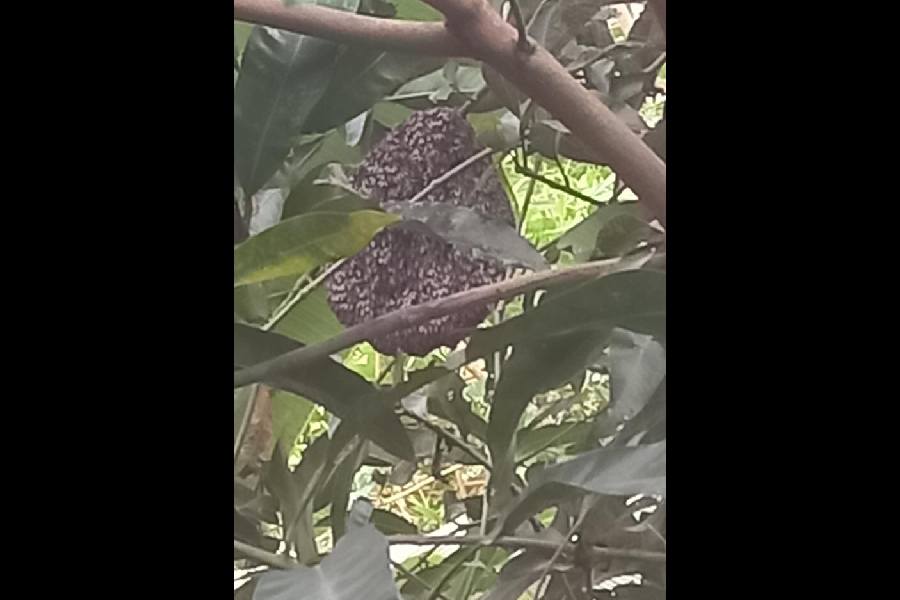Kerala has long grappled with wild animal attacks, but now wasps and bees are also claiming lives.
According to experts, wasp and bee sting can cause death due to an anaphylactic reaction, a life-threatening allergic reaction in which blood pressure falls and the airways close.
The state government has begun paying compensation for wasp and bee sting casualties but has not taken any steps to destroy the hives.
Earlier this month, Raghavan, a resident of Maruthonkara in Kozhikode who was in his 60s, succumbed to a wasp attack while undergoing treatment at the Medical College Hospital there. Four days before that, a group of senior citizens had gone to draw their monthly pension at the Nedumangad sub-treasury when a bee hive in the nearby revenue tower was attacked by an eagle. Seven senior citizens were injured in the resultant bee attack and had to be hospitalised.
Last month, close to a dozen people, some of them migrant labourers from northeastern states, were injured in a wasp attack at the Aikaranad panchayat in Ernakulam district when they were engaged in cleaning bushes .
Ten women suffered injuries in a wasp attack at Kottakkal in the Nagaroor panchayat in Thiruvananthapuram. Kunjupennu and her daughter Thankamma were not as lucky. Last November, they were attacked by a swarm of wasps near Mundakayam in Kottayam when Kunjupennu attempted to remove a dried coconut leaf that fell on a pepper vine plant. Thankamma was also stung when she tried to save her mother. Both died within three days of hospital admission. A few other locals who tried to save them were also targeted by the wasps.
According to entomologists, the population of these deadly insects has skyrocketed even in the cities. Lathika Amma, 68, residing in the heart of the capital city of Thiruvananthapuram, recounts with a shudder how her granddaughter, Deepthi Dinesh, had a narrow escape from bees in February.
“Deepthi was sitting in the veranda of her home playing with her Doberman puppy around 10pm on a Saturday. Suddenly out of the blue some insect bit her on her left eye. It got swollen and the next morning we rushed her to an eye hospital. Initially the ophthalmologist couldn’t figure out that it was a bee attack. She missed a week of her engineering classes,” Lathika said.
“It was later that we realised that it was a bee attack as the neighbouring compound which is lying unused has two huge beehives. Once we informed the doctor, he started the correct treatment. Deepthi’s eye condition has improved slightly, but it will still take a while for complete cure. We informed the land owner about our plight, but he is yet to act,” Lathika added.
Dr Sandeep Das, a Science and Engineering Research Board (SERB) national post-doctoral fellow in the department of zoology at the University of Calicut, told this newspaper that the bees were more dangerous than the wasps. He said that when someone sees a beehive or a wasp hive, they have to immediately alert a fire service team, which would get in touch with the forest department.
“A joint effort by the fire force and forest departments would ensure that the beehive or the wasp hive is removed from the area. It will be shifted to another area where it may not pose a threat to human beings. They will ensure that the colony of bees is not disturbed and is shifted elsewhere. In the case of wasps, they target human beings when they fear that they are under threat. It’s an anaphylactic reaction which causes death,” Das said.
Since last July, the Kerala government has been paying a compensation of ₹10 lakh to victims in forest areas and ₹2 lakh in non-forest areas. Dr Giresh Kumar, a leading taxonomist with the Zoological Survey of India, Kozhikode, told this newspaper that a serious study on the population increase in wasps and bees was yet to be conducted.
“Over the last several months, there has been a barrage of reports on wasp and bee attack casualties across Kerala. It has definitely become a menace. The state government needs to initiate a comprehensive study on such incidents. Fortunately, the Kerala government has started providing compensation, but nothing is being done to destroy the hives,” Kumar said.
There are many people who are engaged in apiculture, raising bees and maintaining their colonies. But these honey bee farmers take proper precautions when dealing with the bees.











